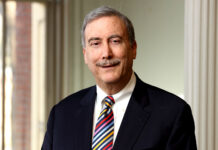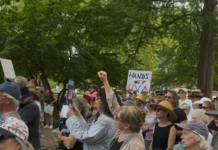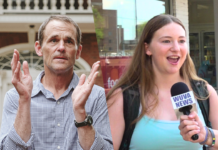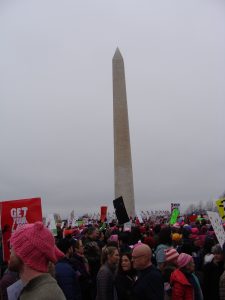 On Donald Trump’s first full day in office, an estimated 597,000 people flooded the National Mall in Washington D.C., gathering in solidarity for the Women’s March. What began as a cross-country collaboration among a handful of women in the wake of the presidential election has grown into a worldwide movement, with sister marches attracting nearly 3 million participants across 50 countries. The march aims to send a strong message to the new administration that a growing coalition intends to hold them accountable when it comes to representing women’s issues.
On Donald Trump’s first full day in office, an estimated 597,000 people flooded the National Mall in Washington D.C., gathering in solidarity for the Women’s March. What began as a cross-country collaboration among a handful of women in the wake of the presidential election has grown into a worldwide movement, with sister marches attracting nearly 3 million participants across 50 countries. The march aims to send a strong message to the new administration that a growing coalition intends to hold them accountable when it comes to representing women’s issues.
The economy, national security, health care, education, criminal justice reform, and climate change “[are] a woman’s issue”, Senator Kamala Harris urged the crowd in her speech during the rally.
“We are tired, as women, of being relegated to simply being thought of as a particular constituency or demographic” Senator Harris said.
The movement seeks to unite these separated policies under a progressive platform, ending violence toward women, advocating for the civil rights and those of women, LGBTQIA, and workers, as well as addressing climate change.
Moreover, the organizers do not intend this march to be an isolated incident but a spark for ongoing civic engagement. Tamika Mallory, a chief organizer and national co-chair for the march, pressed this sentiment.
“When you go back home, remember how you felt. What made you—that instinct, that gut—that said I got to get on a bus, a plane, a train—no matter what—to protect my children. That feeling. Take it back with you to wherever it is you came from today. You have awoken a new and renewed spirit.”
Indeed, participants came from all walks of life, spanning generations. When asked why they were attending, a woman accompanied with her partner expressed a fear of losing her rights.
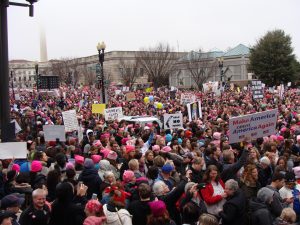 “I am at the march because I am a gay, Jewish, veteran woman, who fought for our rights as Americans and now I’m going to watch them be taken away. I have a partner of 7 years, (…) engaged, and we want to get married. Now we’re afraid we are going to lose those rights. The Jewish community centers that I work for have been getting bomb threats since Trump’s been elected into office and white supremacists are feeling empowered at the moment. So I’m marching to show them that we are not going to lay down and take it.”
“I am at the march because I am a gay, Jewish, veteran woman, who fought for our rights as Americans and now I’m going to watch them be taken away. I have a partner of 7 years, (…) engaged, and we want to get married. Now we’re afraid we are going to lose those rights. The Jewish community centers that I work for have been getting bomb threats since Trump’s been elected into office and white supremacists are feeling empowered at the moment. So I’m marching to show them that we are not going to lay down and take it.”
Many came with their families, including young children who had never been to a march. One godfather shared the important lesson he hoped that children would take away.
“I’m at the march because I want to bring my godson, Justice, down to see real democracy in action. (…) Its really important for the entire country to stand up, show who real Americans are and what we really value. It’s about our future. It’s about women. It’s about everyone’s rights.”
Many participants also came with a history of civic engagement. An elderly woman, accompanied by her husband who had spent his professional career advocating for reproductive rights, described the impact that such demonstrations can have.
“I’m here because I was in the March on Washington in 1963 and I think it actually made a difference. And I feel very strongly that we elected the wrong person president and I hope this march will make a difference.”
Another elderly lawyer cited a history of protesting for the United Farm Workers, women’s movements, and against Vietnam added, “I support women enormously because I married above myself to a strong woman. This is the place to be—in the streets.”
Time will only tell whether these marches have the effect on policy that they seek but their voice and message have been heard across the globe.







